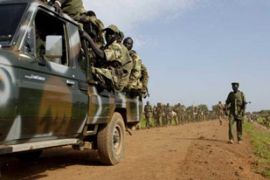Sudanese factions trade accusations
Accusation comes after clashes in potentially oil-rich district leaves 46 people dead.

Civilian casualties
James Hoth, a senior southern army commander, said civilians had been killed, but the number of wounded was not known.
“From (the southern army’s) side, seven dead and 14 wounded, and on the side of (the northern) Sudan Armed Forces, 20 killed and 35 wounded,” he said.
A north-south peace deal in 2005 ended two decades of civil war in Africa’s biggest country, but fighting has flared on several occasions and census results and elections due this year are potential points of friction.
The latest fighting followed Tang’s arrival in Malakal on what he was quoted as saying was a family visit.
He is wanted in the south for his part in an outbreak of fighting that killed 150 people in the same town in 2006.
Changthe said the fighting began when Tang refused to leave Malakal and resisted arrest.
‘Tribal’ clashes
Tang held a news conference in Khartoum on Wednesday in which he described the clashes as “tribal”, pitting his own Nuer tribe against the predominantly Dinka south Sudan authorities.
Speaking through an Arabic translator, he said he had acted in self-defence.
“My problem is with (southern president) Salva Kiir and the southern government, and the problem is between Dinka and Nuer; the Sudanese government has nothing to do with it,” Tang said.
He accused Kiir of harbouring animosity towards him because he fought on Khartoum’s side during the civil war.
Tang also accused south Sudan of working with the International Criminal Court (ICC), which is expected next month to issue an arrest warrant for Omar Hassan al-Bashir, the Sudanese president, for war crimes and crimes against humanity in Darfur.
Old allegiances
“If the decision [the ICC warrant] is issued, it would be the end of the (north-south peace) agreement,” Tang said.
Forces fighting with Tang had been integrated into the northern army as part of a special joint unit of northern and southern forces in Malakal, but Nhial Deng Nhial, the southern army minister, said they had retained old allegiances.
The Sudanese presidency has distanced itself from the events, condemning the violence and urging the warring factions to “seek legal arbitration” to settle their differences, according Suna, the state news agency.
North and south Sudan fought over ideological, cultural and religious differences in a civil war further inflamed by the discovery of oil, mostly in the south.
Under the peace deal, the south is due to vote on possible secession in 2011.